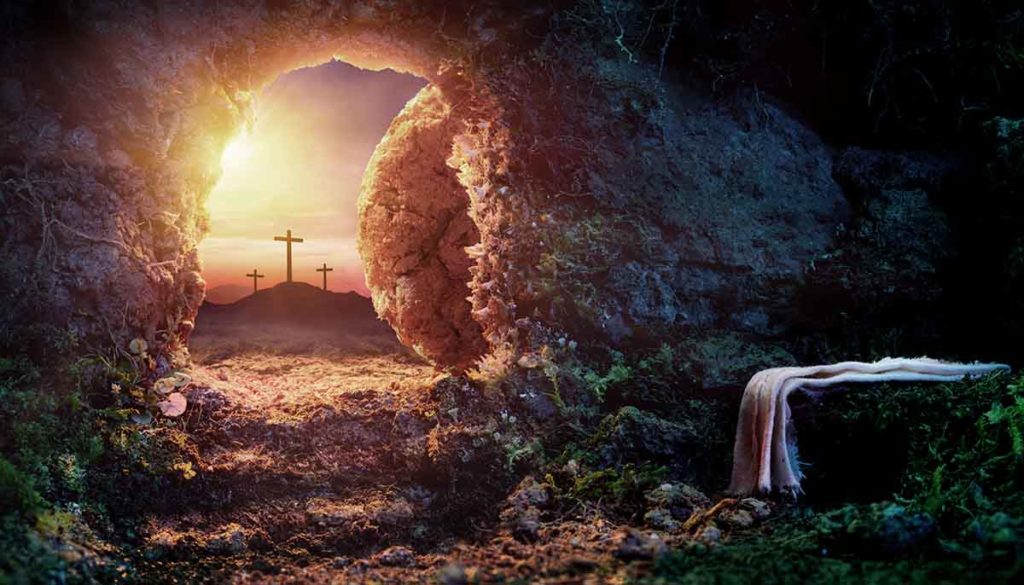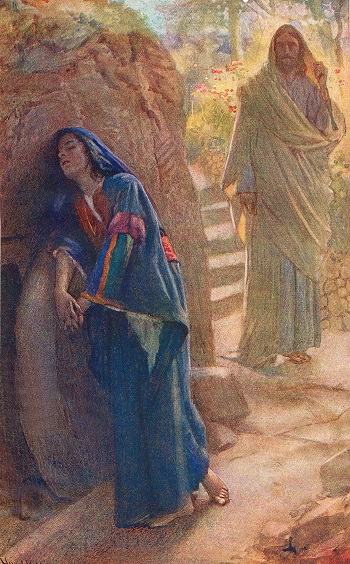Readings: Exodus 15:1-11 | 1 Corinthians 5:6b-8 | John 20:1-18
Text: John 20:1-18
Mary came early to the tomb of Jesus, similar to how we have gathered much earlier than normal for worship this morning. She was intent to do for her Lord what they had not time for when He died. She was prepared to show due reverence to her Lord’s body. The Passover was over. The Sabbath rest had passed. And now what was she expecting to find? The body of her dead Lord. She had seen it happen, along with Mary and Salome.

But it wasn’t as she expected. The stone had been rolled away, so she runs without further investigation and tells Peter and John to report what she fears: “They have taken the Lord out of the tomb, and we do not know where they have laid him.” The three of them all go back to the tomb, John and Peter even running to find out what had happened. John reached it first, but only stooped to look in and see the linen cloths. Perhaps he didn’t want to become ceremonially unclean and have to purify himself. But then Peter comes up, and goes right in, and what he discovers is even more baffling: “He saw the linen cloths lying there, 7 and the face cloth, which had been on Jesus’ head, not lying with the linen cloths but folded up in a place by itself.” Mary had said they took the body of the Lord and laid it somewhere. But what graverobber would bother to fold up the burial linens and fold the face cloth? After this, John goes in and sees it too.
All of these facts are recorded, and the disciples saw and believed this much: The Body of Jesus was indeed not there. But they could not come up with a satisfactory reasonable explanation. So, Peter and James just went home, believing only what their eyes could see and their minds could piece together.

Mary stays on, and she too, is struggling to find a reasonable explanation to all these things. She wept as she looked in at the tomb, which to her, looked all wrong because she was still assuming the Lord she saw die was still dead. It makes me wonder where her formerly-dead brother, Lazarus was at this time, but in her grief, this did not cross her mind.
The three dear disciples, Mary, Peter, and John show us that reason will not come to the Lord. Yes, reason is a gift from God which we use and treasure every day, but reason is limited. Reason comes to conclusions which end in death and do not return. Reason must submit to its master: the Word of God. In all of this, John admits his own failing in retrospect, “for as yet they did not understand the Scripture, that he must rise from the dead.” Totally unreasonable! Yet without the Lord’s Word, all we can conclude is that His Body has been stolen because as far as we can tell, death is permanent.
In belief of only the facts, Mary still weeps. She sees the angels and answers them “They have taken away my Lord, and I do not know where they have laid Him.” She even sees Jesus Himself with her eyes and supposes Him to be the gardener.
But everything changes when He speaks her name: “Mary.” Like floodgates opening, she perceives what reason could not reveal: Her Lord is alive! She sees Him now through faith in His Word and faith in what the Scriptures say!

Faith comes to us when Jesus speaks our Name, too. At the font, we hear His voice through the pastor. _____, I baptize you in the Name of the Father and of the Son and of the Holy Spirit. This is your Christian Name, wherein the Lord reveals Himself to you. This is the name by which He will call you forth from your tomb on the Last Day [John 11:43], the name which is inscribed in the Book of Life [Rev. 3:5], as is said in Psalm 87:5-6:
And of Zion it shall be said,
“This one and that one were born in her”;
for the Most High himself will establish her.
The Lord records as he registers the peoples,
“This one was born there.”
In that Word of Jesus, He reveals Himself to you, and gives you the Holy Spirit so that you believe not just the facts about Him. You know the Scriptures, as they are fulfilled in your Lord Jesus. So He is revealed first not in the flesh, but in His Word and in the holy waters of Baptism.
Then, He says to Mary, so overjoyed with seeing Him, “Do not cling to me, for I have not yet ascended to the Father; but go to my brothers and say to them, ‘I am ascending to my Father and your Father, to my God and your God.’ ” Do not cling to Him yet, because something far better follows His resurrection. If He were to stay on earth, we would all have to flock to see Him in one place as crowds do with the pope visits. But He ascends, yes to “my Father and your Father, to my God and your God.” This is the blessed reality that is revealed by Him: He calls us His own by Name and then comes to dwell within us! Ascended into heaven, filling all things, but especially making you a member of His own Body.
Your risen and ascended Lord lifts you up out of the alienation of sin and the darkness of reason and brings you into Himself where He nurtures and strengthens you. You need not go to one place to cling to Him, because He is able now to give you His own Body and Blood to eat and drink. It’s Communion with your Lord, who has called you by Name “to the assembly of the firstborn who are enrolled in heaven” (Heb. 12:23) Faith clings to Him where He is: In His Word, which is Spirit and Life [Jn. 6:63] and in the appointed signs which deliver His salvation to you.
In the Name of the Father and of the + Son and of the Holy Spirit. Amen.



